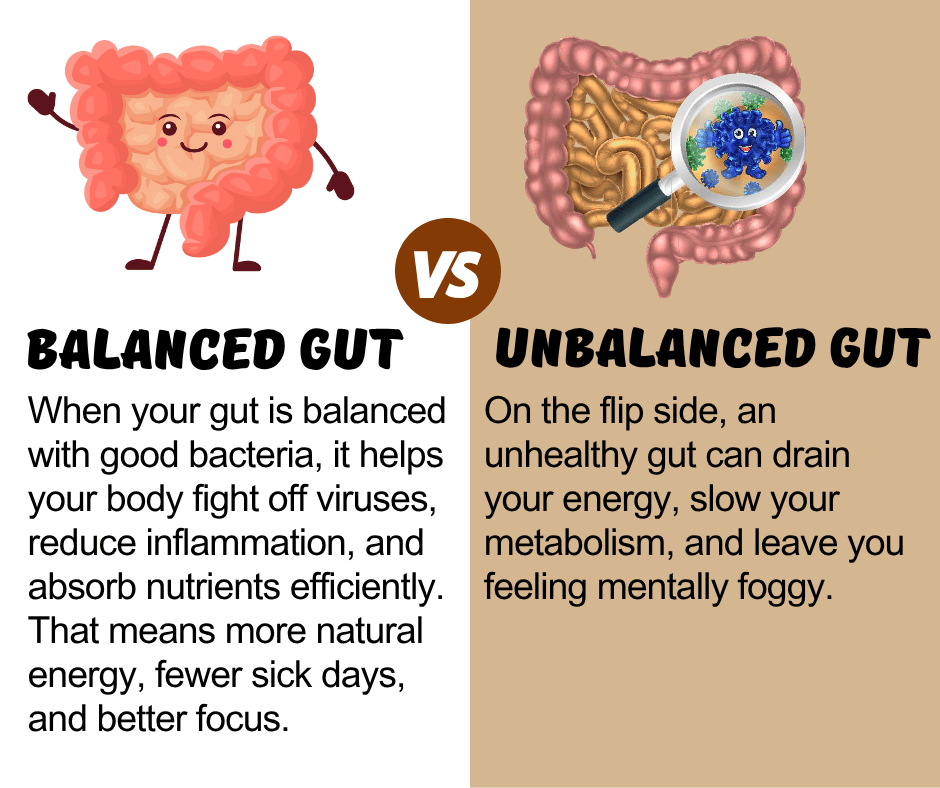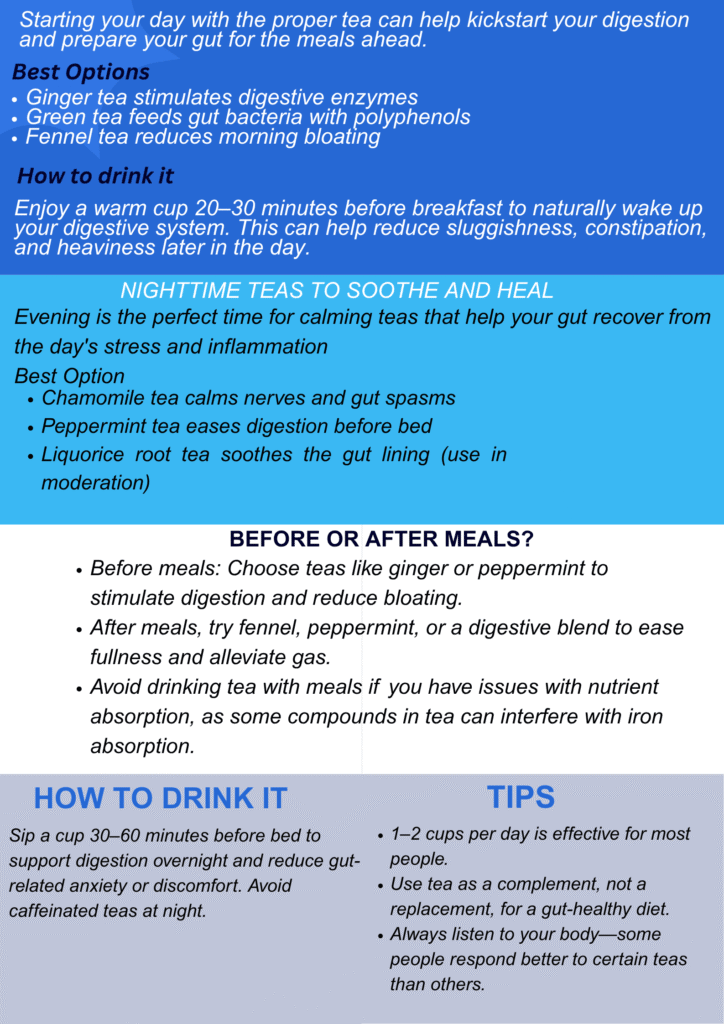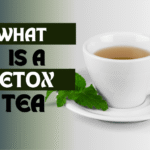Discover the best tea for gut health with our expert guide. Discover which teas naturally soothe digestion, reduce bloating, and support a healthy gut.
Why Gut Health Matters More Than You Think
Your gut isn’t just for digestion; it’s your second brain. Everything that happens in your digestive system can directly affect your mood, immune strength, energy levels, and even mental clarity. More than 70% of your immune system comes from your gut, making it one of the most critical systems to maintain. But here’s the good news: nature has provided simple, soothing solutions to help you support your gut naturally, starting with a warm cup of tea. Let’s explore the best teas that can help calm inflammation, improve digestion, and support your gut’s health, one sip at a time.
1. Your gut isn’t just about digestion—it’s your second brain.
Many people think gut health is only about avoiding gas, bloating, or indigestion. However, in reality, your gut plays a significantly larger role in your overall well-being. The gut is lined with millions of nerve cells and is closely connected to your brain through the gut-brain axis. That’s why scientists often refer to it as the “second brain.” When your gut is out of balance, it doesn’t just affect your digestion—it can lead to mood swings, poor concentration, and even anxiety or depression. This simple yet powerful idea captures attention and demonstrates to readers why gut health matters far beyond the stomach.
The Link Between Gut Health and Immunity, Energy, and Mental Clarity
A healthy gut supports a strong immune system because it houses over 70% of your immune cells.

Explaining these connections helps readers understand that gut health is a foundation for their overall health, not just digestion.
Explore the best teas that can soothe, heal, and support your gut.
First, we need to understand the importance of gut health. It promises a natural, easy, and enjoyable solution to tea that doesn’t involve pills, complicated diets, or expensive treatments. It signals that the article will be helpful, practical, and full of specific recommendations, which makes the reader more likely to stay on the page and read till the end.
2. How Tea Supports Gut Health (The Science in Simple Terms)
Tea isn’t just a relaxing drink; it’s a mixture of natural compounds that are good for your gut. If you’ve ever wondered how a simple cup of tea can improve digestion, reduce bloating, or support gut healing. Here’s how it works in simple terms
1. Antioxidants, Polyphenols & Anti-Inflammatory Power
Green, black, and herbal varieties are rich in antioxidants and polyphenols, which act like protectors for your gut lining. These natural compounds help reduce inflammation, which is the root cause of many digestive problems like IBS, bloating, and leaky gut. By calming inflammation, tea helps your gut function more smoothly and comfortably.
2. Feeding the Gut Microbiome (Tea as a Prebiotic)
Your gut contains trillions of tiny bacteria, some good, some bad. The good ones are essential for breaking down food, absorbing nutrients, and defending against illness. Tea’s polyphenols and fibers act as prebiotics. They feed the beneficial bacteria, allowing them to grow and thrive. A balanced gut microbiome can lead to improved digestion, enhanced immunity, and a more positive mood.
3. Fermented Teas & Gut-Friendly Bacteria (Like Kombucha)
Fermented teas (Kombucha) go one step further by delivering live probiotics, good bacteria that directly support your gut health. These beneficial microbes can enhance digestion, reduce inflammation, and restore balance after taking antibiotics or consuming a poor diet. Drinking Kombucha in moderation is a natural way to add friendly bacteria to your digestive system.

3. Top 7 Best Teas for Gut Health (Ranked with Benefits)
Not all teas are created equal when it comes to gut health. Some target bloating, others support digestion, and a few even feed or restore your gut bacteria. Here are the top 7 teas you should try, each with unique gut-healing benefits, plus the best way to enjoy them.
1. Ginger Tea
Ginger tea is one of the oldest and most trusted remedies for digestive issues, used for centuries in Ayurvedic and Chinese medicine.
Gut health benefit:
It helps relieve bloating, gas, and nausea by speeding up the movement of food through the digestive tract. Ginger also boosts the production of digestive enzymes, making it easier for your body to break down food.
Best way to drink it:
Drink a warm cup 20–30 minutes before meals to stimulate digestion. Add a splash of lemon or a dash of honey for extra soothing power.
2. Peppermint Tea
Cool, refreshing, and calming, peppermint tea is a go-to choice for anyone experiencing digestive discomfort.
Gut health benefit:
Peppermint relaxes the muscles in the digestive tract, which can help relieve cramps, gas, and symptoms of IBS (Irritable Bowel Syndrome).
Best way to drink it:
Enjoy after meals to ease digestion or sip during an IBS flare-up. Avoid if you have acid reflux, as peppermint may worsen it.
3. Chamomile Tea
Known for its calming effects, chamomile tea doesn’t just help you sleep; it also supports your gut.
Gut health benefit:
Chamomile reduces inflammation in the gut and helps calm the nervous system, which is closely linked to digestive function. It can be beneficial for stress-related gut issues.
Best way to drink it:
Drink before bedtime to calm both your stomach and your mind. You can also combine it with fennel for added gut-soothing effects.
4. Green Tea
Packed with antioxidants, green tea is a favorite for overall wellness, but it’s also a hidden gem for gut health.
Gut health benefit:
Green tea is rich in polyphenols, which act as prebiotics that feed good gut bacteria. It also reduces inflammation and supports the growth of beneficial microbes.
Best way to drink it:
Drink 1–2 cups a day, preferably in the morning or early afternoon. Don’t drink it on an empty stomach if you’re sensitive to caffeine.
5. Fennel Tea
Fennel seeds are often chewed after meals in many cultures to aid digestion, and fennel tea serves a similar purpose.
Gut health benefit:
Fennel relaxes the muscles in your digestive system, helping to relieve indigestion, bloating, and trapped gas. It also has mild antispasmodic properties that soothe the gut.
Best way to drink it:
Ideal after heavy meals. Add a pinch of crushed fennel seeds to boiling water for a more potent infusion.
6. Liquorice Root Tea
Naturally sweet and soothing, licorice root tea has been used to heal the gut lining and ease stomach discomfort.
Gut health benefit:
It helps reduce inflammation and protects the mucous lining of the stomach and intestines. It’s beneficial for those with leaky gut or gastritis, but should be used in moderation.
Best way to drink it:
Drink occasionally—no more than 1 cup per day. Choose DGL (deglycyrrhizinated licorice) if you have high blood pressure, as regular licorice can raise it.
7. Kombucha (Fermented Tea)
Kombucha is a fizzy, tangy, fermented tea rich in probiotics—perfect for those seeking gut health benefits.
Gut health benefit:
It delivers live, beneficial bacteria (probiotics) to your gut, which helps maintain a healthy balance of gut flora. This supports digestion, boosts immunity, and may improve gut barrier function.
Best way to drink it:
Start with ½ cup per day to see how your body reacts, and gradually increase. Look for low-sugar options with live cultures.
Pro Tip:
If you’re new to gut-healing teas, start with chamomile at night or ginger before meals—they’re gentle, effective, and safe for most people.
4. Tea Blends vs. Single Herbs: What’s Better for Your Gut?
Tea Blends vs. Single Herbs: What’s Better for Your Gut?
Numerous tea options are available on the market, from single herbs to elaborate “detox blends”—it can be challenging to select the best one for your gut. Let’s break it down so you know exactly when to reach for a pure herbal tea and when a blend might be more effective.
When to Use Pure Herbal Teas
Single-ingredient teas, such as ginger, peppermint, or chamomile, are excellent when you have a specific digestive issue to target.
- Got bloating? Go with fennel or ginger.
- Feeling stressed or tense? Chamomile works wonders.
- Nauseous or gassy? Peppermint is your best friend.
Because they contain only one herb, these teas are gentler, easier to monitor for side effects, and ideal for individuals with headache problems or those new to herbal tea.
When Blends Like “Digestive Detox” Teas Work Better
Some herbal blends combine multiple gut-supporting herbs to deliver broad-spectrum benefits. These can be effective when you want:
-
General digestive support
-
A “reset” after heavy eating
-
Relief from various symptoms (e.g., bloating + indigestion, + gas)
Look for blends that include herbs such as dandelion, ginger, licorice root, fennel, or turmeric. These combinations can work well after meals or in the evening to gently support digestion and reduce discomfort.
Be Cautious of Harmful Ingredients in Detox Blends
Not all detox teas are gut-friendly. Many popular brands include laxative herbs like senna or cascara sagrada, which may cause:
- Cramping
- Diarrhea
- Dependence on long-term use
These teas may offer quick water weight loss, but they can irritate your gut, disrupt your natural digestion, and even lead to electrolyte imbalances if overused.
Tip: Always check the ingredients list. If it includes senna, skip it—especially if your goal is long-term gut health rather than short-term weight loss.
Final Word
If you’re looking for everyday gut support, opt for single herbs or gentle blends that exclude laxatives. Save detox blends (with caution) for occasional use, and always listen to your body.
5. Best Time to Drink Gut-Healing Tea
When choosing a gut-healing tea, the type you select can be just as important as the tea itself. Whether you’re aiming to improve digestion, reduce bloating, or alleviate gut inflammation, timing your tea correctly can enhance its effectiveness.
Morning Teas for Digestion & Gut Activation

6. What to Avoid: Teas That Can Hurt Gut Health
Some can irritate your gut, cause discomfort, or undo your efforts to improve digestion. If your goal is better gut health, avoid these common tea mistakes:
1. High-Caffeine Teas on an Empty Stomach
Black tea, oolong, and matcha offer some health benefits, but their high caffeine content can be harsh on an empty stomach.
Problem:
- Can trigger acid reflux or stomach pain
- It may increase stomach acidity and irritate the gut lining
- It can cause nausea.
Better options
If you enjoy caffeinated tea, you can combine it with food or drink it later in the morning for optimal enjoyment. Alternatively, consider switching to low-caffeine options, such as green tea or white tea.
2. Artificial Flavors
Teas with “natural flavors,” artificial colors, or synthetic fragrances may taste good, but they don’t belong in a gut-healing routine.
Problems
- It may contain hidden additives that disrupt gut bacteria
- Some artificial ingredients can lead to gas, bloating, or inflammation
- Offers no real herbal or medicinal benefit
Better options:
Stick with 100% pure herbal teas with added sugars or laxatives
3. Teas with Added Sugars or Laxatives
Many store-bought “detox” or “slim” teas are loaded with added sugars or contain harsh laxatives, such as senna or cascara sagrada.
Problem:
- Sugar feeds harmful bacteria in your gut, promoting an imbalance
- Laxatives may cause dependency, dehydration, and gut irritation
- It can lead to cramps, diarrhea, and long-term gut damage
Better option:
Choose unsweetened teas or sweeten naturally with a bit of raw honey or stevia. And avoid any tea that promises “overnight weight loss”—those are red flags.
Final Word
For a truly gut-friendly tea routine:
- Focus on natural, single-ingredient, or well-balanced herbal teas
- Watch labels for caffeine, additives, and laxatives
- Treat tea as part of your long-term gut health strategy, not a quick fix
7. Real-User Tips: How to Make Gut-Boosting Tea a Daily Habit
Adding gut-friendly tea to your daily routine doesn’t have to be complicated. With the right approach, it can become a simple and enjoyable habit that supports your digestion every day. Here’s how real tea lovers make it work:
1. Create a Simple Tea Routine (Morning, Mid-Day, Night)
Instead of drinking tea randomly, build it into your daily rhythm:
- Morning: Start your day with ginger or green tea to wake up your gut and improve digestion before breakfast.
- Mid-Day: Enjoy peppermint or fennel tea after lunch to reduce bloating and boost digestion.
- Evening/Night: Wind down with chamomile or licorice root tea to soothe your stomach and relax your gut for restful sleep.
Tip: Set a tea reminder on your phone or pair your tea time with another habit (like journaling or reading) to make it stick.
2. How to Brew for Maximum Gut Benefit
To get the most out of each cup, follow these brewing tips:
- Use fresh, filtered water for the best taste and nutrient extraction.
- Cover your mug while steeping herbal teas to trap essential oils and healing compounds.
- Brew herbal teas for a longer time (5–10 minutes) and green or black teas for a shorter time (1–3 minutes) to avoid bitterness.
- Add gut-friendly ingredients like lemon, raw honey, or a slice of fresh ginger for extra soothing power.
Tip: Don’t microwave your tea. Boil water separately and steep for better flavor and benefits.
3. Know the Safety Basics (Especially for Herbal Teas)
Herbal teas are natural, but not all are safe in large amounts or for everyone.
- Avoid overuse of potent herbs like licorice root, senna, or dandelion root.
- Check for potential interactions if you’re taking medications or are pregnant, especially with teas such as peppermint, chamomile, and licorice.
- Rotate your teas every few weeks to keep your body responsive and balanced.
Tip: When in doubt, check with your doctor or a qualified herbalist before starting a new herbal tea habit, especially if you have chronic digestive issues.
Final Word
The key to gut-healing tea success? Consistency, quality, and timing. Build your tea ritual, choose clean ingredients, and listen to how your body responds. Over time, you’ll notice improved digestion, less bloating, and a calmer gut.
8. Conclusion: Which Tea Will You Try First for Your Gut?
Your gut is the foundation of your overall health, so supporting it naturally with the proper tea is one of the most straightforward steps you can take to promote your well-being.
Whether you’re dealing with bloating, indigestion, or want to feel lighter, there’s a gut-friendly tea for you.
Not sure where to begin?
Start with a soothing cup of ginger or chamomile tea today. These are gentle, effective, and easy to fit into your daily routine.
Small habits make a big difference—especially when it comes to digestion, energy, and even mood.
9. FAQs About Gut Health & Tea
Still, have questions about using tea for better digestion? You’re not alone. Below are some of the most frequently asked questions people have when starting a gut-healing tea routine.
Can tea replace probiotics?
Not entirely, some teas, such as kombucha (a fermented tea), do contain natural probiotics. Others, such as green tea or chamomile, contain prebiotics (compounds that feed your good gut bacteria). However, tea alone can not be an alternative to natural components. Tea is a supportive tool, not a complete substitute.
How long before I see results?
It depends on your body and consistency. Many people notice reduced bloating, improved digestion, and decreased gut discomfort within a few days to a week of drinking herbal teas daily. For long-term gut healing, especially if you’re addressing issues like IBS, leaky gut, or inflammation, it may take 3 to 6 weeks of consistent use alongside a gut-friendly diet and lifestyle.
Tip: Track how you feel after drinking specific teas to find your best match.
Which teas are safe during bloating or IBS flares?
If you’re feeling bloated, gassy, or going through an IBS flare-up, choose gentle, anti-spasmodic teas like:
- Peppermint tea helps relax intestinal muscles and ease cramping.
- Chamomile tea calms inflammation and gut-brain tension.
- Fennel tea naturally reduces gas and bloating.
- Ginger tea helps move trapped gas and soothe nausea.
Avoid High-caffeine teas (such as black or matcha) and harsh detox blends during flare-ups, as they may exacerbate symptoms.


